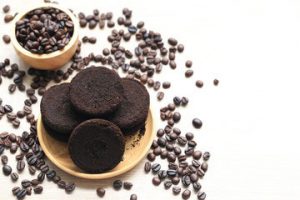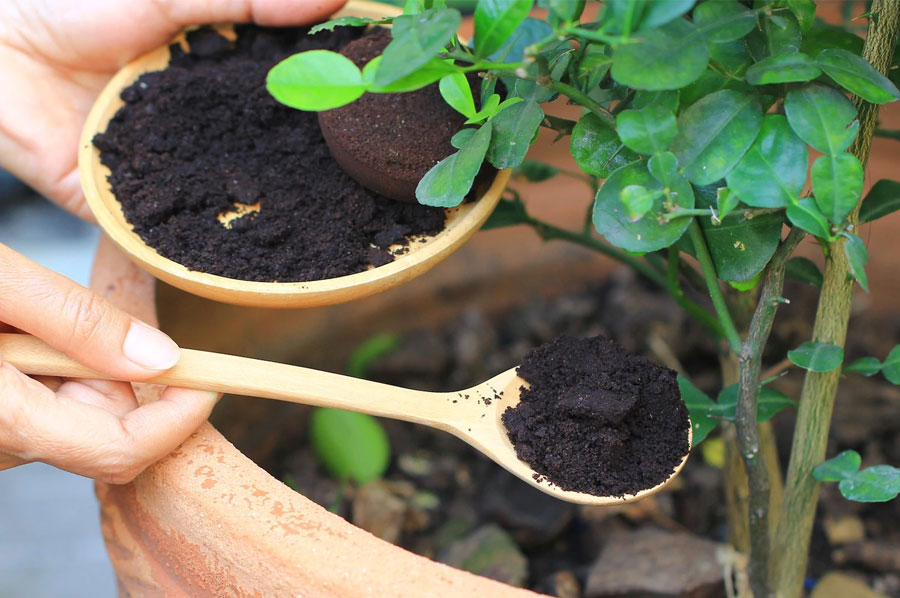I’ve never been that keen on coffee and consider myself more of a tea drinker, but my better half can’t get enough of the stuff; needing more than a few cups to get her through her days. As a gardener, this is good news for me as I can use the used coffee grains in a variety of ways; from mixing it into my compost, to using it as fertiliser.
Using used coffee grounds in the garden has become a bit of a hot topic recently, with people arguing both for and against it. From what I’ve read, it seems like people are going to either extreme with their points of view, whereas I sit somewhere in the middle and believe that used coffee grounds do have their uses in the garden, but you have to know what you are doing with them or you could end up producing negative effects.
If you are interested in the proper way to use coffee grains in the garden, this article is for you. We will explain the different ways to benefit from this natural source, and also how to avoid the pitfalls that can come with it.
Using used coffee grains in your compost
To make good compost you need a combination of ‘green’ and ‘brown’ material. These terms don’t refer to the actual colour of the material used, they refer to them being either nitrogen rich (green materials) or carbon rich (brown materials). Used coffee grains are classed as green materials and can be used to make compost, but they have to be balanced out by brown material on a four-to-one ratio.
In addition to providing nitrogen, used coffee grains also contain other helpful nutrients such as potassium and calcium and so are a great addition to your compost, you just have to be careful not to overdo it or you could end up reducing the amount of helpful micro bacteria.
Using used coffee grounds as mulch
There are a lot of articles out there that advise people to use used coffee grounds as mulch without really going into details, and this is unhelpful at best, and irresponsible at worst. The thing is, if you just go and throw a load of used coffee grounds down on the soil as mulch, you will inadvertently harm your plants. As we all know, coffee contains a lot of caffeine, and even the used grounds still contain enough to repress growth in your plants if used in a large amount.
Another problem with using coffee grounds as mulch is that they have a tendency to clump together and this forms a sort of barrier that stops moisture getting through to the plants. This doesn’t mean that coffee grains can’t be used as mulch, it just means that you have to do it the right way. Mixing a little into some other organic matter and then using the combined mixture as a mulch is the way to go, or simply spreading a very thin layer of grains and mixing it in with your top soil.
Related Articles:
- Quick gardening breaks – Working at home
- Growing Herbs in Pots UK
- 5 best petrol pressure washers [UK] best value buyers guide [November 2020]
- Avoid costly mistakes: guide to the best lawn mower for your garden
Altering your soil’s pH with used coffee grains
While there are a lot of people advising to use coffee grains as a way to add acidity to garden soil, it isn’t something I would recommend. The reason being that different types and brands of coffee have different levels of acidity, and not that many of them are acidic enough to have any real impact on your soil’s pH even before they’ve been used, and are pretty much neutrally balanced once they have been. With this in mind, it seems pretty pointless to be relying on used coffee grains to increase acidity in your soil, and you’re much better off using a water and vinegar solution to do the job instead.

Used coffee grains as fertiliser
Most fertilisers contain a mix of nitrogen, phosphorus, and potassium, and this is usually referred to as the NPK ratio. Used coffee grains also contain all three of these nutrients, as well as others like magnesium and calcium, and so they can be used as fertiliser, but you should only sprinkle a thin layer down, or better still; mix it with vermicompost for excellent results. To make a liquid fertiliser that you can then feed to your plants, simply leave one and a half to two cups of coffee grains stewing in 4-5 gallons of water overnight. The next day you can spray it onto the leaves of your plants, or pour it onto the soil.
Warding off slugs and other pests with coffee grains
Sorry guys, this is another one that I have tried but haven’t seen any results from. Now, it could just have been the particular coffee I was using, as some people swear by it, but in my experience used coffee grains do nothing to stop ants, slugs, or any other pests crawling all over your plants. The grains might not make things comfortable for garden pests, but I saw absolutely no advantage of using it.
So, you have it. My honest opinions on the pros and cons of using coffee grains in the garden, and a few tips on how to do it all properly. Although often vaunted as a super-material for gardeners, or on the other end of the scale; a poison, in reality it lies somewhere in between. It has it’s uses and it is certainly better to be utilising it then throwing it away, but you have to know what you are doing, and I hope that after reading this article, you now feel like you do.
If you enjoyed this article and found it useful, then we would like to invite you to spend a bit more time on this site exploring the tons of content we have provided for you. There are pages upon pages full of helpful guides, how to articles, DIY projects, and in-depth product reviews. Please enjoy browsing our site.
